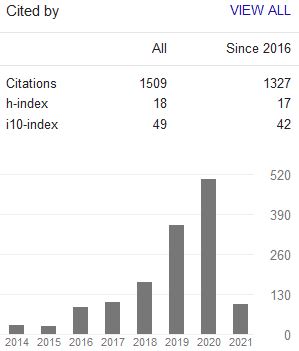RELIGIOUS FREEDOM IN INDONESIA: Between Upholding Constitutional Provisions and Complying with Social Considerations
Abstract
Human rights, including freedom of religion, are generally accepted and granted by all governments regardless of their ideology, political, economic, and social conditions. In a Muslim majority country such as Indonesia, ideally freedom of religion is considered to mean that the government allows religious practices of religious minorities or other sects besides the state religion, and does not persecute believers in other faiths. This paper discusses Indonesia’s constitutional provisions concerning legal rights of citizens on freedom of religion, whether the government upholds the constitution as a concrete way to deal with human rights protection or it complies with some groups’ demand to tighten restrictions on “the Western concept of” religious liberty. This paper concludes that even though there are many provisions in the Indonesia’s constitution and in its legal system which is supportive of religious freedom, some governmental provisions were enacted based on social considerations, rather than to strengthen constitutional provisions.
Keywords
Full Text:
PDFReferences
Asian Human Rights Commission (AHRC). “Indonesia: Ratification of Key Human Rights Instruments Must be Followed by Legal Reform.” a Statement by the Asian Human Rights Commission, retrieved from:
Baderin, Mashood A. International Human Rights and Islamic Law. Oxford: Oxford University Press, 2003.
Bukhari, al-, Sahih Bukhari, Volume 4 and 9.
Charter of the United Nations (1945)
Crouch, Melissa. “Regulating Places of Worship in Indonesia: Upholding Freedom of Religion for Religious Minorities?.” Singapore Journal of Legal Studies (2007): pp. 96-116.
Dickson, Brice. “The United Nations and Freedom of Religion.” International and Comparative Law Quarterly, vol. 44, issue 2 (1995).
Dixon, M. Textbook on International Law. 3rd edition. London: Blackstone, 1996.
Dupret, Baudouin, Maurits Berger, and Laila Al-Zwaini (eds.). Legal Pluralism in the Arab World. Leiden: Brill, 1999.
Electronic Resource Centre for Human Rights Education, retrieved from: http://¬www.hrea.org/erc/Lib¬rary/¬First_Steps/-part1_eng.¬html
Forum 18. “Freedom of Religion: A Report with Special Emphasis on the Right to Choose Religion and Registration Systems.” Forum 18, retrieved from: http://www.forum18.org/PDF/freedom¬of¬reli¬gi¬on.pdf
Gvosdev, Nikolas K. “Constitutional Doublethink, Managed Pluralism and Freedom of Religion.” Religion, State & Society, Vol. 29, No. 2 (2001).
Hathaway, Oona A. “Do Human Rights Treaties Make a Difference?.” The Yale Law Journal, 111 (2002): pp. 1935-2042.
Keith, Linda Camp. “Judicial Independence and Human Rights Protection around the World.” Judicature, Vol. 85, No. 4 (2002): pp. 195 – 200.
Kipp, Rita Smith and Susan Rodgers. “Introduction: Indonesian Religions in Society.” in Rita Smith Kipp and Susan Rodgers (eds). Indonesian Religions in Transition. Tucson: University of Arizona Press, 1987.
Landman, Todd. Protecting Human Rights: A Comparative Study. Washington DC: Georgetown University Press, 2005.
Macklem, Patrick, “What is International Human Rights Law? Three Applications of a Distributive Account.” Bernard and Audre Rapoport Center for Human Rights and Justice University of Texas School of Law, November 19, 2007, retrieved from:
McLeod, Ross H. and Andrew MacIntyre. Indonesia: Democracy and the Promise of Good Government. Singapore: ISEAS, 2007.
Pierre, Richard and Burns H. Weston (eds). Human Rights in the World Community: Issues and Action. Philadelphia: University of Pennsylvania Press, 2006.
Saeed, Abdullah and Hassan Saeed. Freedom of Religion, Apostasy and Islam. Burlington, VT: Ashgate Publisher, 2002.
Setunga, Philip. “Religious Freedom not Secure in Indonesia.” World Wide Religious News (WWRN): Asia/Pacific–Indonesia/Brunei, retrieved from:
Stahnke, Tad and Robert C. Blitt. “The Religion-State Relationship and the Right to Freedom of Religion or Belief: A Comparative Textual Analysis of the Constitution of Predominantly Muslim Countries.” Georgetown Journal of International Law, Vol. 36 (2005): pp. 947-1078.
The Economist; 2/16/2008, Vol. 386, Issue 8567, p. 54-55.
The Tandem Project, United Nations, Human Rights & Freedom of Religion or Belief, 2008, retrieved from:
U.S. Department of State, Bureau of Democracy, Human Rights and Labour, Annual Report on International Religious Freedom: Indonesia (2008), retrieved from:
U.S. Department of State, Bureau of Democracy, Human Rights and Labour, Annual Report on International Religious Freedom: Indonesia (2007), retrieved from:
U.S. Department of State, Bureau of Democracy, Human Rights and Labour, Annual Report on International Religious Freedom: Indonesia (2005), retrieved from:
UN General Assembly Resolution 719 (VII); 1953, and UN General Assembly Resolution 285 (111); 1949.
Witte, John, Jr. and D. van der Vyver. (eds). Religious Human Rights in Global Perspeective: Legal Perspective. The Hague: Martinus Nijhoff Publishers, 1996.
Zamir, M. Human Rights Issues and International Law, Dhaka: University Press, 1990.
DOI: 10.15642/JIIS.2013.7.2.383-403
Refbacks
- There are currently no refbacks.
Indexed by:
Journal of Indonesian Islam (ISSN 1978-6301 and E-ISSN 2355-6994) is published by the Postgraduate Program (PPs) and the Institute for the Study of Religion and Society (LSAS), State Islamic University (UIN) of Sunan Ampel Surabaya.
Journal of Indonesian Islam by http://jiis.uinsby.ac.id/index.php/JIIs/index is licensed under a Creative Commons Attribution-ShareAlike 4.0 International License.
Copyright ©2020 State Islamic University (UIN) of Sunan Ampel Surabaya. Powered by Public Knowledge Project OJS.







